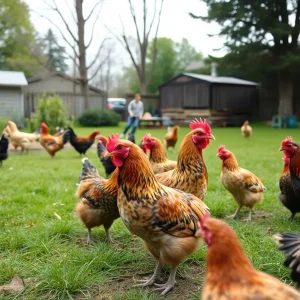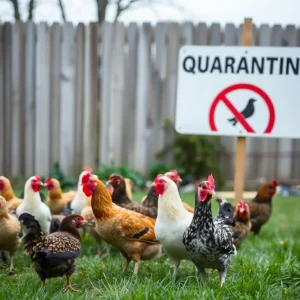Lansing, Michigan – Invasive Spotted Lanternfly Detected in Wayne County
The spotted lanternfly, an invasive insect known for its potential to damage agriculture, has been confirmed in Wayne County, Michigan. The state’s Department of Agriculture and Rural Development (MDARD) made the announcement following surveys that also identified the pest in Monroe and Oakland counties.
About the Spotted Lanternfly
This species was first reported in the United States in 2014, originating from southeastern Pennsylvania. Since then, it has spread to multiple states, including but not limited to Connecticut, Delaware, Indiana, Maryland, and New Jersey. The spotted lanternfly feeds on over 70 different types of plants, especially grapes, apples, and hops. Its ability to cause damage to vital crops raises significant concerns among farmers and local communities.
Why Awareness is Key
Steve Carlson, the Director of MDARD’s Pesticide and Plant Pest Management Division, emphasized the importance of public awareness in managing the spread of this pest. “These surveying efforts are crucial in our effort to slow the spread of the spotted lanternfly, which can be a nuisance to Michiganders and is a source of concern for fruit growers,” Carlson stated. The insect may not fly long distances, but it can lay its eggs on various surfaces, including:
- Cars
- Trailers
- Firewood
- Outdoor furniture
Before leaving an infected area, it’s advised to check your belongings for potential hitchhikers. Additionally, anyone receiving shipments from states known to have the spotted lanternfly should inspect their goods and packing materials for any egg masses.
Understanding the Damage
The way the spotted lanternfly operates can be detrimental to plants. It draws sap from host plants, and in doing so, it releases a sugary substance known as honeydew. This sticky liquid can lead to the growth of black sooty mold, which harms the plants and creates a messy situation for property owners. The honeydew can also attract other pests like yellow jackets and flies.
Lifecycle and Identification
Spotting a spotted lanternfly is easier during its adult phase which lasts from late summer to the first hard frost. Adults are about one inch long and have unique characteristics:
- When their wings are closed, they appear gray to brown with black spots.
- When opened, their vibrant yellow and black underside is revealed, along with bright red hind wings adorned with black spots.
In the fall, the female lays egg masses that resemble old chewing gum, covered with a gray, waxy coating. These egg masses can survive through winter, hatching in the spring as brownish, seed-like structures. The juvenile lanternflies are wingless and have a black body with white spots, showing red patches as they mature.
What To Do If You Spot One
If you come across a spotted lanternfly or its egg masses, it’s important to report it. Take several photos and note the time, date, and location of your sighting. Reports can be sent to MDARD via email or by calling 800-292-3939. If you can safely collect a specimen, doing so can help with identification efforts.
Stay Informed
For those living in areas where the spotted lanternfly has been detected, checking maps of confirmed locations may be beneficial. For more information about identifying and reporting the spotted lanternfly, visit MDARD’s official website.
The invasion of the spotted lanternfly is a reminder of the necessity for vigilance in protecting local ecosystems and agriculture. With public cooperation, Michigan can work towards managing and possibly eradicating this pest from its communities.




























